Three Crucial Lessons to Learn from Beloved Missy Franklin
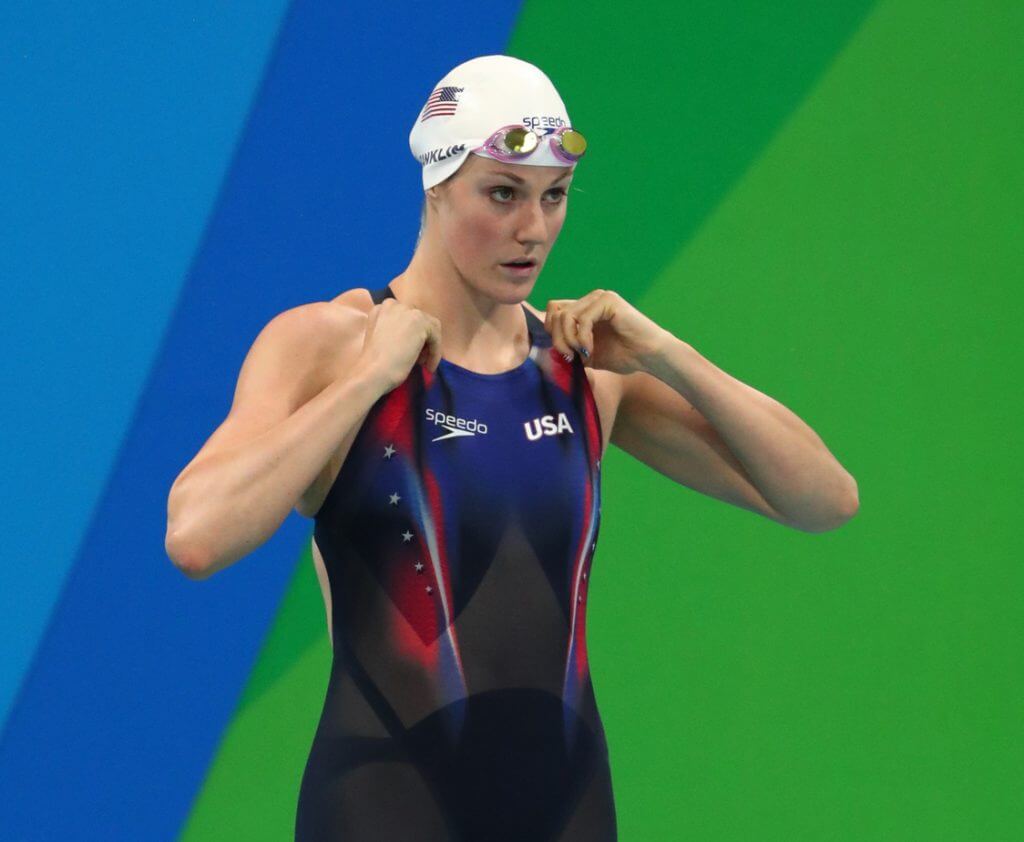
By Jamie Kolar, Swimming World College Intern.
As the swimming community is aware, Missy Franklin made her return to the pool after a two-year hiatus from competition. No, she did not break a world record or any meet records for that matter. Her biggest accomplishment of the meet was cracking the top 10 of the American women for the 200 freestyle: Not the Franklin the world is used to seeing.
Being an athlete in the spotlight is not something to be taken lightly – it has its ups and downs. This sport is not a merciful one; it leaves swimmers battered and bruised most of the time, and the results are certainly not always what they bargained for.
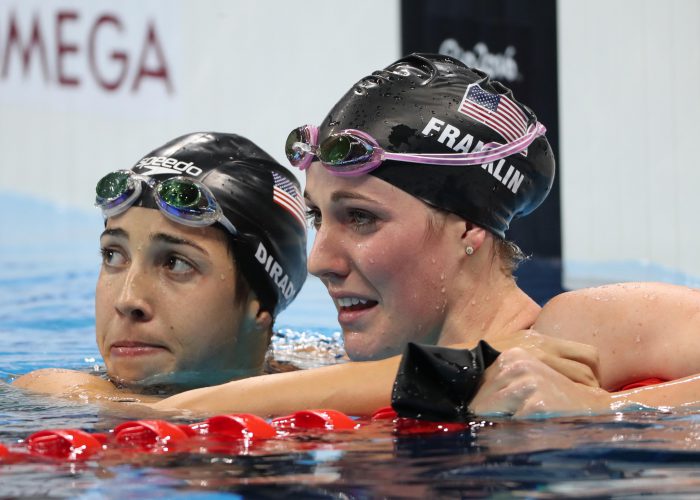
Photo Courtesy: Erich Schlegel-USA TODAY Sports
Franklin is no exception to this cycle that has consumed so many elite and amateur athletes alike. Despite swimming slightly off her best times, she is in an inspiration to many swimmers in the United States and around the world. She has embraced her journey, even though it was not quite the one that she expected.
She has taught us several lessons that have nothing to do with stroke technique or race strategy, which perhaps are more important in the long run. She has courageously taught the swimming world how to graciously handle the setbacks that are bound to happen in life, whether inside or outside of the pool.
1. It is okay to try something new.
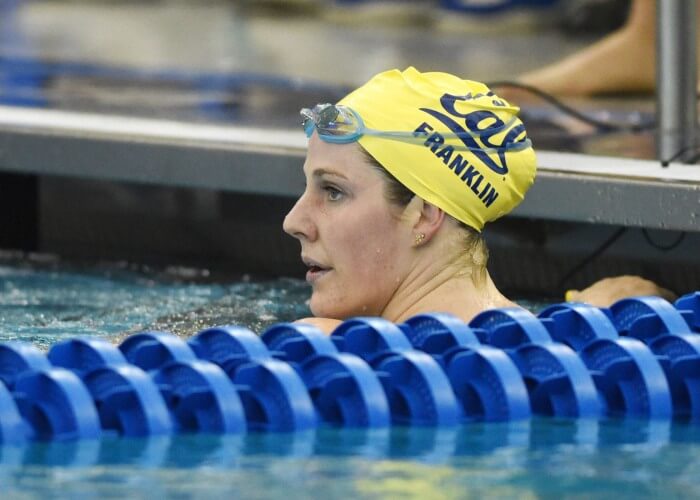
Photo Courtesy: Evan Pike – USA TODAY Sports Images
After the 2012 Games, Franklin was the All-American girl. Her smile and fun-loving relationship with her coach Todd Schmitz enraptured the nation. And with all the attention, she made the decision to go to the University of California-Berkley to try a new strategy with a new coach, new training and a new environment. These changes would later prove less beneficial than her previous training.
So what was she to do? Try something else and keep moving forward.
Many agree that the definition of insanity is doing the same thing repeatedly and hoping for a different result. If something is not working after you have given it an honest, all-in effort, then it is more than okay to move onto the next idea. Continue moving until you find what actually works. What works for one person may not work for you, and that is more than okay!
2. Have a relentless spirit.
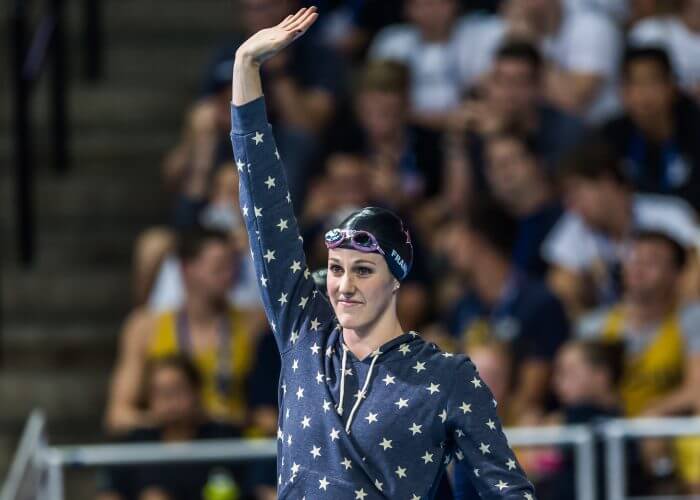
Photo Courtesy: Peter H. Bick
If one thing can be said about Franklin, it is that she has a relentless spirit. She is not just an athlete, swimmer or a competitor – those qualities only begin to describe the girl behind the goggles. The heartbreak and disappointment that followed the 2016 Games could have ended her career. Surely that thought crossed her mind. But here she is, showing the world that she is no where near the end of her career. Her fire and passion is not easily extinguished.
Not many athletes have this sort of fight in them; disappointment is hard to swallow and digest. Time can heal some wounds, but the sting always lies beneath the surface. What really matters is what a swimmer does with that sting. Will it push them to keep going, or will it cut their story short?
Only you can answer that question. When you are doubting your abilities, look to Franklin and know that anything is possible with the right mindset and action plan.
3. It’s not over until it’s over.
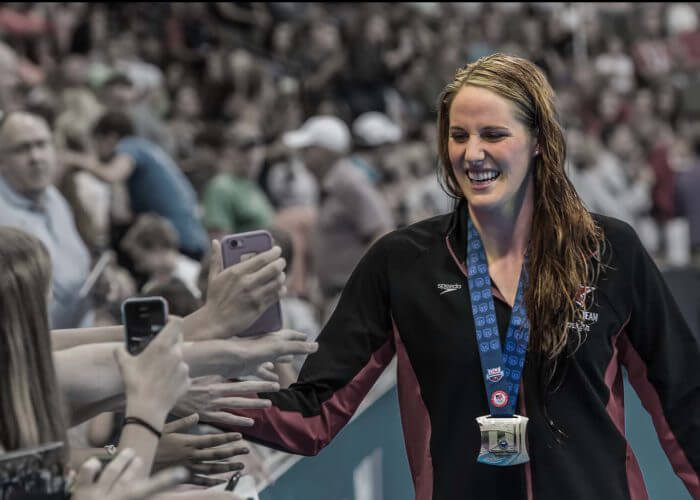
Photo Courtesy: Peter H. Bick
Franklin could have easily walked away from this sport after Rio. She did not have to prove anything else to the world. We all know that she is talented and would have respected her decision. But here she is. Why not hang up the goggles and walk away forever?
Because it’s not over until it’s over.
She still has some unfinished business in the water, and she feels that she still belongs there. Some fight has yet to be fought, and the swimming world eagerly awaits. It will be one heck of show!
Franklin has taught the swimming community what it means to fight until the bitter end. She will walk away from this sport on her own terms, hopefully knowing that she had nothing left to give. We can all follow the lead from Missy to fight to the end.
“Leave it all in the pool,” Ted Mullin, past Carlton College swimmer and cancer victim, used to say. Every practice and race, whether your first or last, should be swum with all the strength you have – nothing less. That way, you can leave the pool with the peace of mind that you did everything within your power and had nothing left.
Commentary: All commentaries are the opinion of the author and do not necessarily reflect the views of Swimming World Magazine nor its staff.




Fay Salam
” Her biggest accomplishment of the meet was cracking the top 10 of the American women for the 200 freestyle”
FYI:
The #10 of the American women for the 200 freestyle is thirteen years old.
Brylee Weaver
keep it up Missy
Focused, determined
Speedo, please bring back this suit. Best tech suit ever.
I would have thought that the number one lesson was don’t quit college and turn pro.
Tell that to Ledecky….hahhaahah …7 million buys a LOT at College….and still CRUSHING world records….so your comment is …I don’t even know what it is..except funny…lol
Dagny Knutson was a world class swimmer. Until she gave up all her college eligibility and turned pro.
Kate Ziegler was an even better swimmer. Until she gave up all her college eligibility and turned pro.
Katie Hoff was arguably an even better swimmer. Then, she gave up all her college eligibility and turned pro.
Missy Franklin was better than all of them when she decided to quit college and turn pro.
All four swam much worse after turning pro than before, and I do not believe that any of them have ever graduated from college. Maybe Katie Ziegler, but maybe not. While Missy Franklin is now back in school, Cal-Berkley is a better school than some of the Ivies; Georgia is not.
The story of the decision by Ariana Kukors to turn pro instead of going to college seems to be even more tragic than the other four.
Hopefully things work out for Katie Ledecky, but there are few things that are as worthwhile as the type of education that you can get at a place like Stanford, and I would be really surprised if she graduates. Even if things work out for her, it hardly shows that one really good lesson from the career of Missy Franklin is that quitting college to become a professional swimmer is usually a bad idea.
Interesting that 2 fairly major things were not mentioned in this piece; her diagnosed depression and her shoulder surgery. Clinical depression is a pretty major performance killer, ie Allison Schmitt. I wonder what type of shoulder surgery she had. Mine turned out to be a structured problem in the joint itself and not just a rotator cuff problem.
*structural*
LEANDER…..WOMEN swimmers “usually PEAK”…at 18-21..max……so when do you go to college..18-22..so you quit college RIGHT when your career is almost thru….for MOST……and as a little addit…The average starting pay for a Stanford graduate with a computer-science degree is $90,000…..so lets do BASIC MATH..KATIE LEDECKY got 7 MILLION dollars for 1 thats ONE…contract….for a 6 year deal….even if the deal was for her LIFETIME….thats still more than 90,000 into 7,000,000 …10 YEARS= 900,000…do I really need to go on…..and KATIE will get her degree…but she will NEVER HAVE TO USE IT…..so Katie did not ruin her career by turning PRO….and just my humle opionion..the THING that RUIN WOMENS swimming careers…are BOYFRIENDS……just saying…
Well said Michael!